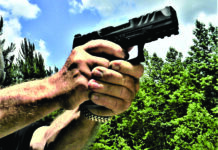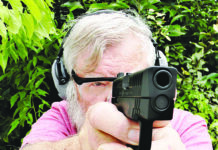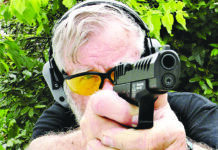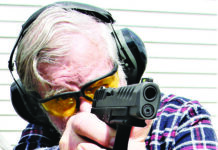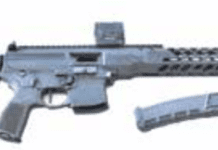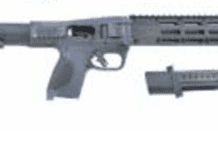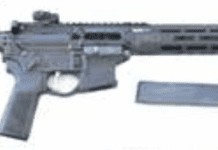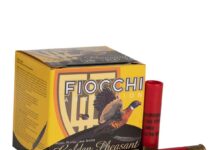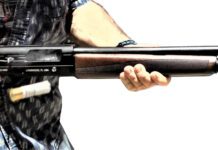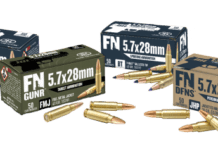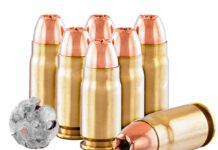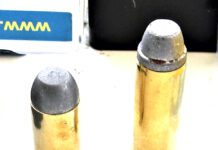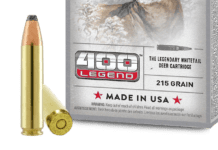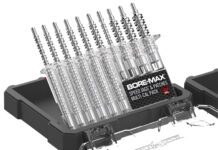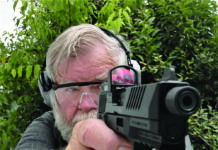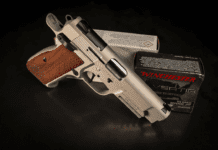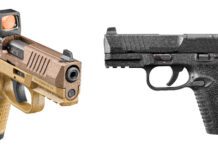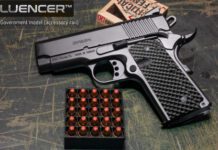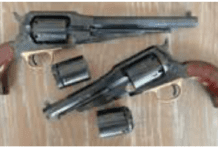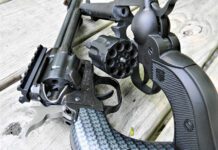Gun Tests Grade: A-
$1799
Christensen Arms is known for its carbon-fiber barrels, but the company also makes some very nice rifles with standard tubes. Christensen barrels start with 416 R stainless steel. Our hand-lapped 24-inch sample was free-floated, button-rifled, and had a match chamber. Twist on the 6mm Creedmoor models is 1 turn in 8 inches. Using 5⁄8×24 threads, Christensen mounts a muzzle brake with four ports on each side, along with four more that are top/center in the brake and are closed off with Allen screws. Those can be removed to allow the shooter to tune this rifle’s recoil impulse and the amount of muzzle jump. The No. 4-contour barrel and the muzzle brake are both finished with a matte-black Cerakote. A 17-inch-long carbon-fiber handguard surrounds the free-floating barrel. It is securely fastened to the chassis with eight screws and is lined on both sides and the bottom with M-Lok slots. The overall effect of the weight distribution leaves the rifle easy to carry using a hand immediately in front of the magazine well. But it doesn’t balance quite as well as we would have liked for the PRS game. The front end was just a bit too light for resting properly on a bag or barricade.
| Action Type | Bolt |
| Action | Cerakote brown steel |
| Overall Length | Adjustable |
| Weight Unloaded | 9.0 lbs. |
| Weight Loaded (108 grain, 4+1 rounds) | 9.7 lbs. |
| Overall Height w/o Scope Mount | 7.1 in. |
| Barrel | 24 in. long, 1:8 twist, Cerakote black steel |
| Sight Radius | NA |
| Magazine Type | AICS pattern detachable box |
| Magazine Capacity | 10 |
| Stock | Folding 7075 aluminum chassis |
| Stock Drop at Comb | Adjustable |
| Stock Drop at Heel | Adjustable |
| Stock Bedding | V-block |
| Stock Buttplate | Limbsaver pad |
| Stock Length of Pull | Adjustable |
| Receiver Scope-Base Pattern | Rem 700 pattern, 20-MOA Picatinny rail |
| Trigger Pull Weight | 1.4 lbs. |
| Safety | 2-position thumb rocker |
| Warranty | Limited lifetime |
| Telephone | (888) 517-8855 |
| Website | ChristensenArms.com |
| Made In | USA — Utah |
The chassis is made of 7075 billet aluminum and is hardcoat anodized at completion. Our sample was Desert Brown and very slim. The stock folds to the right using a button on the left side of the chassis. Once folded, the stock is held in place via a strong magnet. Even after all the shooting was complete, we didn’t detect any perceptible movement in the stock when it was extended and locked.

The buttstock portion of the chassis is thoroughly skeletonized. Christensen Arms nevertheless took the time to add flat surfaces in all the right places to allow this rifle to be used with a bag, backpack, branch, whatever.
The adjustable cheekpiece is also carbon fiber. Adjustment is made on the cheekpiece as well as length of pull on the buttstock by sliding their attached metal supports in or out and then locking them down with multiple Torx screws. Both support bars have index marks on them, making the settings easy to repeat. The Limbsaver recoil pad can also be adjusted in the vertical, sliding up and down in a track.
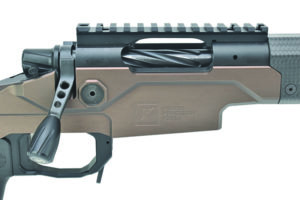
The action brings many more special touches. The bolt handle, body, and shroud have all been spiral-fluted and nitrided. A 20-minute-of-angle Picatinny rail comes mounted via a proprietary design we really liked. It uses a standard Remington 700 screw pattern. This rail sports two claws that extend down from the bottom of the rail into the top lip of the ejection port, further ensuring that the scope rail will not move under recoil.
The rifle is fed with AICS-compatible detachable box magazines. They are released by a paddle mounted on the center line just in front of the trigger guard and which is easily accessed by either forefinger. The left side of the chassis, immediately in front of the trigger guard, has been relieved upward to allow right-handed shooters to more easily insert a magazine while remaining in a prone position.
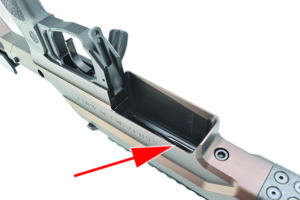
The safety is a two-position thumb rocker just behind the bolt handle. The bolt release is a stud that projects into the channel used by the left bolt lug and pivots to the rear to release the bolt. The twin-lug bolt has an M16-style extractor, a single ejector, and it encloses the case head. The pistol grip is an AR style made by Hogue. It was a little too thin and slick for our tastes, but fits perfectly with the minimalist concept of the rifle in general.
Last, the MPR sports a great Trigger Tech trigger. We like the feel of the flat-faced design. We find it very easy to get our finger on the trigger in the same place every time and love the tiny extra bit of leverage it provides as we press it smoothly to the rear. This one is adjustable for weight of pull without disassembling the rifle.
The MPR averaged 0.73 inch for multiple five-shot groups across five different types of ammo. The Berger factory 105-grain bullets and the Federal cartridges loaded with Sierra 107-grain MatchKings were right at 0.5 inch for their groups. It was the other Federal load that brought the averages up. The MPR wound up in second place in the group shooting phase by 0.01 inch. This rifle can shoot. And we found the Christensen to have far less recoil than we would have expected given a base weight of only 9 pounds. In fact, part of what interested us in this rifle was the light weight. We found the MPR to have slightly more muzzle rise, especially when compared to the Masterpiece Arms. We also thought it was very easy to manhandle around a barricade. It actually seemed to float on us a little when we really needed it to set into the bags, but the speed of movement brought Christensen in for a second-place finish.
Our Team Said: We need to remember that this rifle was not designed for the long-range competition game and it is light for a reason. All considered, we think the MPR shoots above its weight class and could be a solid Production Division rifle. We also think that this would be a superb rifle to take for a long walk on a hunting trip, even more so with the light, carbon-fiber-wrapped barrel.
6MM CREEDMOOR Range Data
| 6MM CREEDMOOR Range Data | |||||
| Black Hills 103-grain ELD-X | Ruger Precision Rifle | Savage 110 Elite | Christensen MPR | Masterpiece Arms PMR Pro | |
| Average Velocity | 2819 fps | 2935 fps | 2899 fps | 2839 fps | |
| Muzzle Energy | 1907 ft.-lbs. | 1971 ft.-lbs. | 1923 ft.-lbs. | 1844 ft.-lbs. | |
| Best Group | 0.62 in. | 0.44 in. | 0.59 in. | 0.61 in. | |
| Average Group | 0.75 in. | 0.73 in. | 0.75 in. | 0.79 in. | |
| Black Hills 108-grain ELD-M | Ruger Precision Rifle | Savage 110 Elite | Christensen MPR | Masterpiece Arms PMR Pro | |
| Average Velocity | 2730 fps | 2875 fps | 2890 fps | 2922 fps | |
| Muzzle Energy | 1705 ft.-lbs. | 1983 ft.-lbs. | 2004 ft.-lbs. | 2049 ft.-lbs. | |
| Best Group | 0.55 in. | 0.54 in. | 0.66 in. | 0.64 in. | |
| Average Group | 0.75 in. | 0.66 in. | 0.89 in. | 0.83 in. | |
| Berger 105-grain HT | Ruger Precision Rifle | Savage 110 Elite | Christensen MPR | Masterpiece Arms PMR Pro | |
| Average Velocity | 2830 fps | 2934 fps | 2891 fps | 2926 fps | |
| Muzzle Energy | 1867 ft.-lbs. | 2008 ft.-lbs. | 1949 ft.-lbs. | 1997 ft.-lbs. | |
| Best Group | 0.58 in. | 0.65 in. | 0.40 in. | 0.35 in. | |
| Average Group | 0.67 in. | 0.72 in. | 0.50 in. | 0.61 in. | |
| Federal 105-grain OTM | Ruger Precision Rifle | Savage 110 Elite | Christensen MPR | Masterpiece Arms PMR Pro | |
| Average Velocity | 3056 fps | 3146 fps | 3129 fps | 3160 fps | |
| Muzzle Energy | 2179 ft.-lbs. | 2308 ft.-lbs. | 2284 ft.-lbs. | 2329 ft.-lbs. | |
| Best Group | 0.78 in. | 1.27 in. | 0.77 in. | 0.56 in. | |
| Average Group | 0.86 in. | 1.46 in. | 1.00 in. | 0.76 in. | |
| Black Federal 107-grain SMK | Ruger Precision Rifle | Savage 110 Elite | Christensen MPR | Masterpiece Arms PMR Pro | |
| Average Velocity | 2959 fps | 3049 fps | 3022 fps | 3058 fps | |
| Muzzle Energy | 2081 ft.-lbs. | 2209 ft.-lbs. | 2171 ft.-lbs. | 2222 ft.-lbs. | |
| Best Group | 0.69 in. | 0.87 in. | 0.52 in. | 0.59 in. | |
| Average Group | 0.94 in. | 0.96 in. | 0.53 in. | 0.66 in. |


